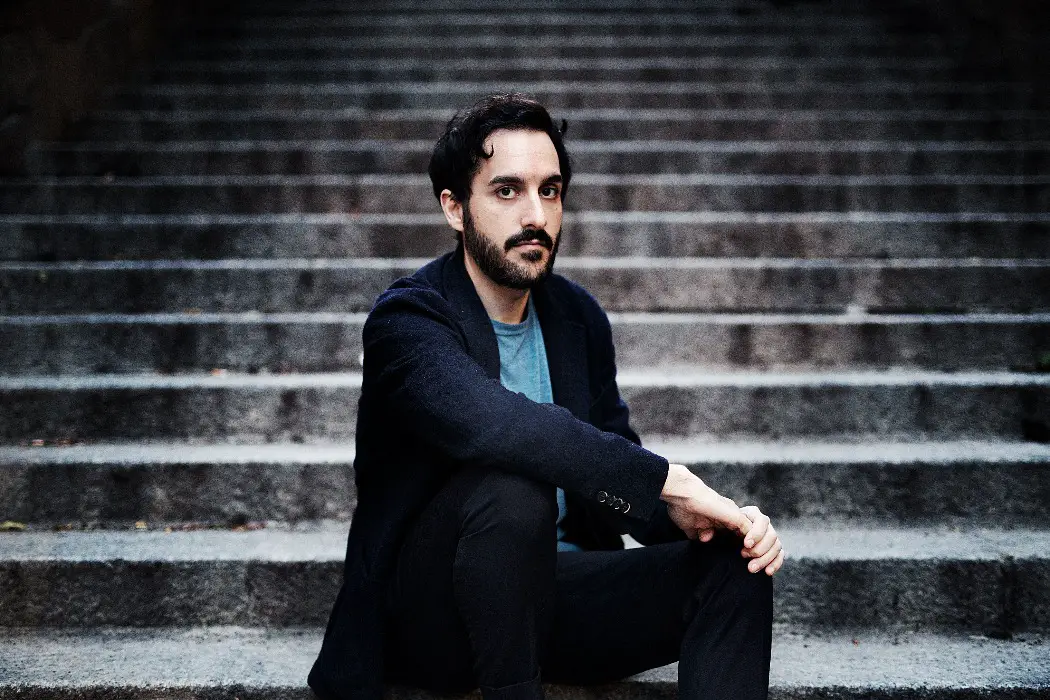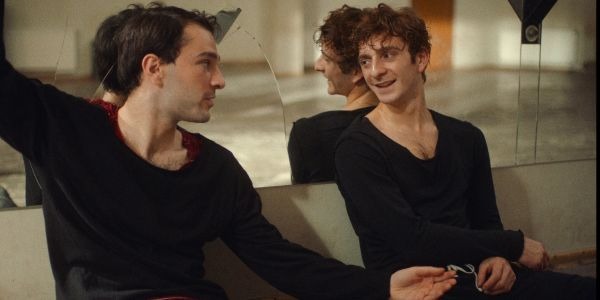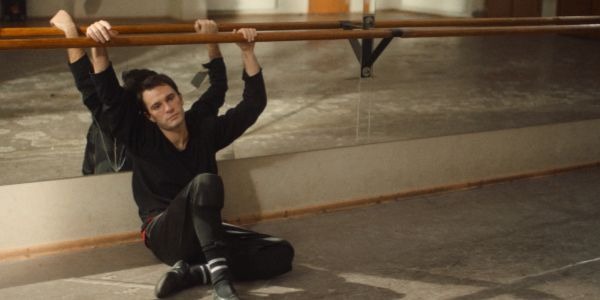“Nobody Can Dictate To You What You Should Be” Interview With Levan Akin & Levan Gelbakhiani Of AND THEN WE DANCED

I'm a geeky, yet lovable film fan who adores horror…
Levan Akin’s mesmerising and life-affirming And The We Danced premiered at Cannes Film Festival last year and ever since then, it’s become a huge film phenomenon around the world, picking up prizes left and right, making Akin and star Levan Gelbakhiani talents to look out for.
And Then We Danced follows young dancer Merab who begins to develop feelings for fellow dancer Irakli in the strict country of Georgia. The film notoriously opened in November in Georgia to a violent mob targeting moviegoers, proving that films like this are still sorely needed.
We sat down with Akin and Gelbakhiani last October at the London Film Festival and talked about directing intimacy on screen, Robyn and how it feels to have your film be compared to Call Me By your Name.
Maria Lättila for Film Inquiry: You had your first screening here last night. How did it go?
Levan Akin: We got a standing ovation!
Wow! First of all, how did this film get started, do you have a background in dance?
Levan Akin: Well, actually, not really. But I’m Georgian. I was born in Sweden, my parents are from Georgia. And I saw in 2013, they were going to have a Pride parade. 50 kids in Georgia decided to have a Pride parade, which is so cool. But unfortunately, they were attacked by a mob of thousands. So it was really sad seeing that in the news. And you can see the clips on YouTube if you want to watch it. I had this idea that I should go to Georgia, as I had the opportunity as a person not living in Georgia to do something on this topic without risking my life basically. So I went there in 2016, three years later and started doing research on this topic. And that was sort of the genesis of the movie, I had no idea that it was going to become this film. I was just sort of searching in the dark and talking to people.
Were you always really keen on setting it in Georgia? Did you ever think about setting it in Sweden?
Levan Akin: No, no. It’s an intrinsically local story that works because of the context. And I really wanted to make something that could hopefully also have an impact on not just Georgia but the entire region.
And there’s a scene where your character and Irakli, they dance in the streets with some other people. Does Georgian dance does still have a place in the youth culture?
Levan Gelbakhiani: Yeah. Quite a lot of people are dancing now. If you just look on Twitter you will see it.
Levan Akin: They dance for tourists.
Have you been able to screen this in Georgia?
Levan Gelbakhiani: It will be released in November.
Levan Akin: Yeah, we had one screening for the community and some political figures and friends. And that went really well. And then we’re going to have a regular premiere in November.
How was the casting process? You found Levan on Instagram. Was it hard to find people who can both act and dance?
Levan Akin: It was, but I didn’t think so much about the dance part. I was like, I’ll make that work somehow. Worst case scenario we’ll have a body double or something. I was thinking more about finding people that made me curious. And all of the actors in the film are really, really strong. Because they’re so layered, there’s so much life. So I just found my gut feeling I would see somebody would be like, Okay, this is perfect for the film. The real heart of the movie was finding Levan as Merab, he’s is so amazing.
What was it in his Instagram feed that made you go “Yes, I want him”?
Levan Akin: When I saw the Instagram feed, it wasn’t like, I want him. But he could dance and this feels dopey to say but he felt earnest and sweet. And I wanted to find like a sweet character that could be like a regular Georgian boy, who is not threatening in any way, just like a sweet kid, basically. And he looked like a sweet kid on his Instagram. And then we met and the camera loved him. I remember we did screen tests, his face works well on film.

And Levan G., you said no to this quite a few times. Why was that?
Levan Gelbakhiani: Yeah, five times probably, because of the topic. And because of this fear that I can’t be safe in Georgia, because they can really literally kill you because they’re crazy. So this was really my biggest fear. But then, after all, I started thinking that it will be my biggest failure if I say no.
It’s your first film. What did you find challenging about the whole process?
Levan Gelbakhiani: The whole process was tough, but at the same time releasing, I don’t know if it’s good expression to say like that. There were a few things that were really hard and I tried to do it, but also the situation on set was like family and we all are really connected to each other. And basically the whole cast became friends.
Levan Akin: It was a very safe environment.
Levan Gelbakhiani: Technically there were a few scenes that were really hard. The final scene, and the long shot after the church scene. But the thing is also that we had just 27 days to film and we had like 12 hours per day.
I imagine that you had a lot of rehearsals before the actual shoot.
Levan Akin: Not so many table reads actually. I had a script, but I only had a beginning, a middle and an end. I wanted to do a very classical story. And then I wanted to fill it with things that inspired me in the moment, stories I heard while researching and stuff. We had dance rehearsals, for sure. And then we had acting rehearsals more since I work with a lot of amateurs. I just wanted to fine tune their impulses and for them to be in the moment, really listen and feel each other.
And then the dance scenes, they feel so organic, especially the ones where it’s much more about your true self and your expression of your identity. Was there any improv there? Or was it all choreographed?
Levan Akin: The Honey scene was really in the moment. We just played that tune.
Levan Gelbakhiani: He just played the song. And I was like, Okay, let’s dance. It was really improvised. The final scene, we had the choreography and I had some points. And basically, I had the beginning, and when it’s becoming like more a mix between Georgian and contemporary dance, I didn’t have the whole choreography, just a few points that I knew that I had to do these two steps. And then the rest of the dance was improvisation.
Was there any improv in the dialogue? Or did you stick to the script?
Levan Akin: Not like improv improv, but I would do a scene and then I would let them do the scene as they felt that they wanted to do it, where their intuition took them. And then I would look at that and I’ll be like, okay, that works, this doesn’t work. Let’s change this a little. And let’s do it. So it was like fine tuning but I’m not a big fan of dialogue improvisation, the acting tends to become too sloppy. I’ll say one like, a core of what I want to get out of this and I think that sort of becomes muddled when it’s too improvised. That’s my feeling.
I really loved all the dancing, you really get close to the characters in those scenes with the camera. Often all dance scenes are shot from so far away. How did you approach them?
Levan Akin: So I did the teaser for the movie like one year before, just for financing reasons. And that’s really 10 minutes of what I thought this thing would be with him and everything in it. We should put that on the DVD. I filmed with a little Canon camera and I got really close. And I really liked that feeling. So when it was time for us to choose a cinematographer, my producers suggested Lisabi Fridell who has a lot of that style, very like documentary and in her feeling and it was the perfect combination between us and she could really carry what I wanted to do with the film.
And we’ve got talk about the scene with Robyn’s Honey, it’s so perfect. People get so excited during it. How did you start creating it from like the script level?
Levan Akin: I just had a script that said Merab dances sensually and playfully for Irakli. And for the first time, he’s truly feels free and relaxed. That was it. That was it.
But why the cut in the middle?
Levan Akin: Because the whole film is actually edited from the notion that we cut into everything late and we cut out of everything little too early, because we want to keep people wanting more and wanting to see it again and again and again. I don’t think it would be as impactful actually, if it was longer. We tried it in edit. And that was the perfect timing point because actually the Honey dance scene is also the lead up to their sex scene, it’s the same scene. It’s like the foreplay before they have sex. It is Robyn and it’s her Honey song. I can’t have that for like 1 minute and 15 seconds because to me, I think it wouldn’t be tasteful.
Was it always going to be Honey in that scene?
Levan Akin: No. We tried several songs. Her album has just dropped. So we were listening. And so we were trying Monument by Robin and also Indestructible. We have footage of those

Your character is obviously a dancer and you’re a dancer but were you able to find any other similarities between you and Merab?
Levan Gelbakhiani: I mean, the whole movie is so real and so natural. Maybe personally, I don’t have a lot of similarities. But the whole perspective, it looks so Georgian and it’s really us.
How did you find working with Bachi (Valishvili) ? You’ve got such great chemistry in the film.
Levan Akin: Well, we did a chemistry test, I instantly knew that they were going to have good chemistry because Levan blushed.
Levan Gelbakhiani: I was so shy.
Levan Akin: I was like, okay, that’s perfect.
But you were able to overcome that shyness. Also, that level of intimacy. How did you want to capture that and how do you direct intimacy on screen?
Levan Akin: Like you direct any scene. It’s very technical, sort of, we choreographed it. An intimacy scene to me is like any other scene, it’s a scene with dialogue and conflict and things happening, except it’s not spoken. It’s spoken through the actions, the intimate actions. I had other things more like narratively that I wanted to get through with those scenes. The first one I wanted to keep it in one shot, because I wanted to convey this feeling of being them, there. We all sort of have these memories of our first sexual encounter, and you’re very much in the moment, it was like your stomach had butterflies, everything. And I really wanted to capture that feeling. So that’s why there’s no edits in it. But other than that it’s like any other scene to make, and we obviously had a smaller crew for that scene. So everybody wasn’t in there, gawking at the boys.
My absolute favorite shot is when you’re sort of behind that rock, curled up in a ball together.
Levan Akin: That’s my favorite, too. I love that shot.
Was that scripted? Or did you come up with it in the moment?
Levan Akin: It wasn’t scripted. I wrote in the script that they’re hugging. And that it’s actually not a rock. It’s a something called a kvevri, which is a Georgian winemaking vessel. So it’s a very symbolic thing.

There’s a lot of people who are comparing this to Call Me By Your Name. How does that make you feel?
Levan Akin: It feels like a huge compliment, because it’s a great movie. So we’re just happy.
It’s a very different story.
Levan Akin: Call Me By Name is really a first love story. And this is a story about finding your place in a traditional society and the love story is more of a catalyst for him finding his way. To me, this is about overcoming the boundaries of tradition and finding your own place in it. It’s like an empowerment story. But I think he’s under the lazy to compare all the gay movies with each other. More common with this movie thematically would be Dirty Dancing.
And can you just quickly talk about the violence? Well, the lack of it, because you said that it is a real threat still today for you? There’s not a whole lot of it, but there’s constantly the threat of it.
Levan Akin: No, because I wanted this film to feel hopeful, like a warm embrace to the audience. And I don’t want to hurt his character. We love him so much. Can you imagine this movie, how bad it would have been if something happened to him, I would never be able to look myself in the mirror. Because it was so important for me that he was never going to be a victim in the movie. He was always a hero, always standing up for himself. And when he falls in love with Irakli, he never questions his sexuality and certainly never has any anxiety about it. He’s just full of love. And that’s what I wanted to show with this film. Love is love. And that’s why it was so important for me to not go into that trope. Nobody was going to die in this movie. I used to dance tropes, like somebody has to hurt their foot if it’s a dance movie, and there has to be a final dance.
I used to be a dance teacher, a very long time ago. And this was very relatable on so many levels. And final question, what do you want people to take away from it?
Levan Akin: Everything? I want them to take away the nobody can tell you what it means to be alive. Nobody can dictate to you what you should be, to fit a certain mold of a cultural tradition. This dialogue that’s so rampant right now, about what is a real Swedish person, what are the boxes you need to click and who are these people telling us this and why we need to take that narrative back and own it ourselves and stand up for ourselves and be like, Listen, I can be trans and Swedish and Muslim at the same time, because that’s for you to decide. And I’m not going to let you hijack that. That’s what I want people to take away from this. I’m tired of all of these crazy bigots dictating us.
Film Inquiry would like to thank Levan Akin and Levan Gelbakhiani.
And Then We Danced is released in cinemas 13th March.
Does content like this matter to you?
Become a Member and support film journalism. Unlock access to all of Film Inquiry`s great articles. Join a community of like-minded readers who are passionate about cinema - get access to our private members Network, give back to independent filmmakers, and more.
I'm a geeky, yet lovable film fan who adores horror cinema, musicals and my dog Geordie La Forge. I'm from Finland, but based in London.













